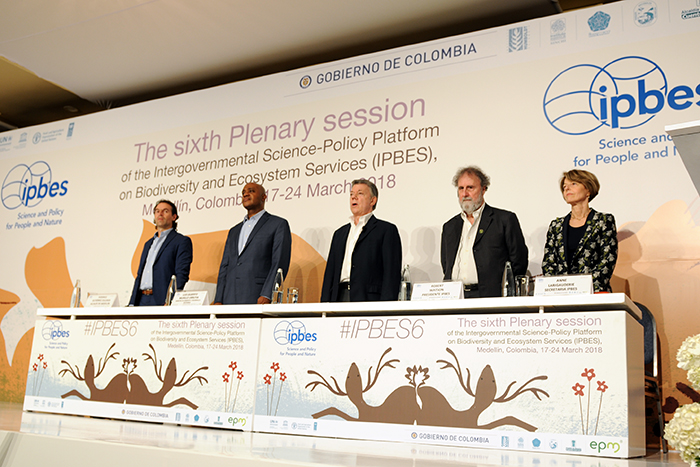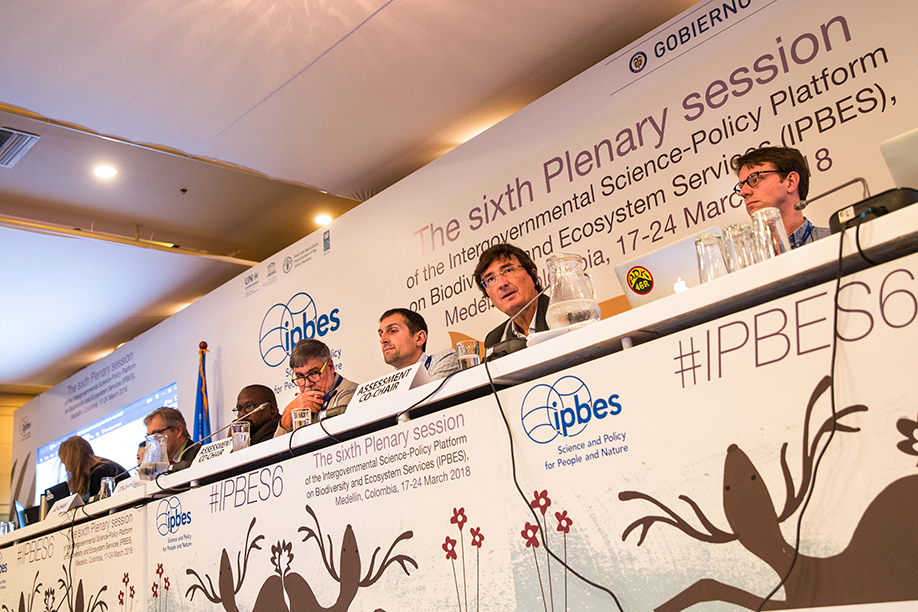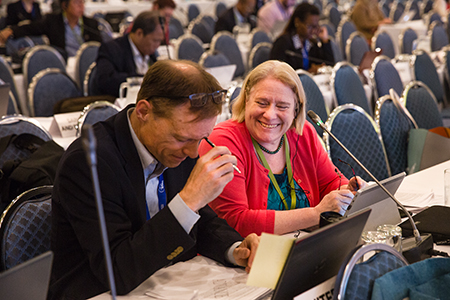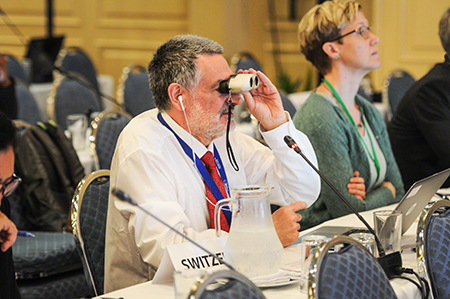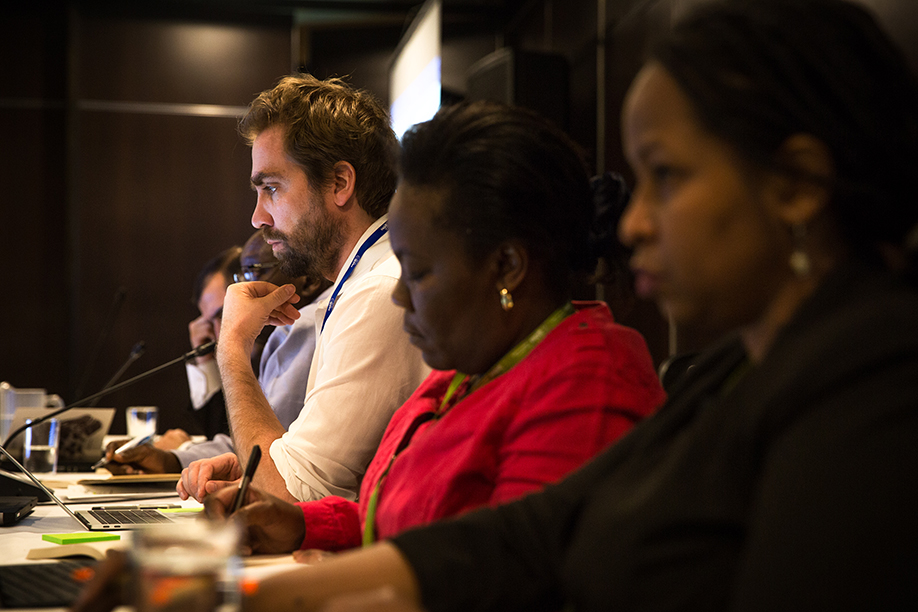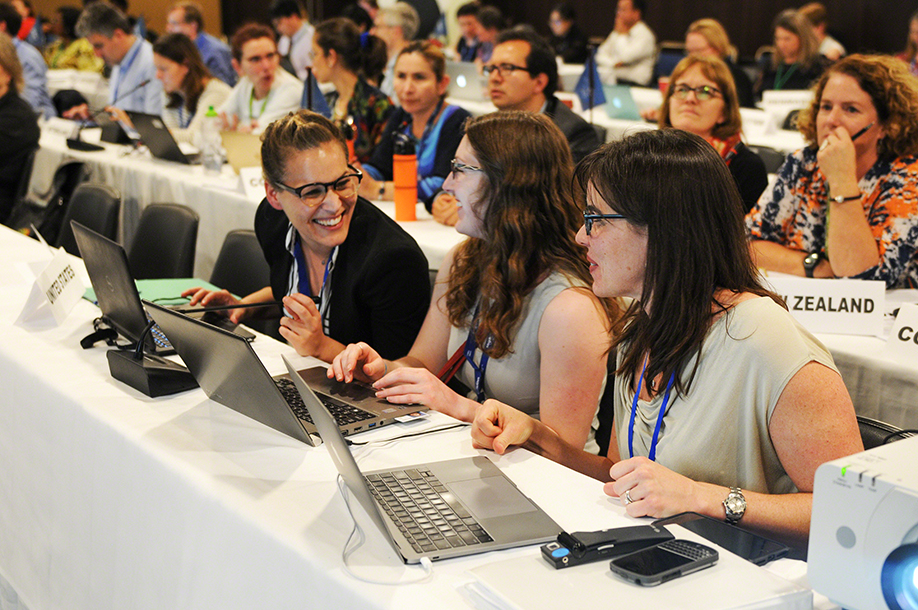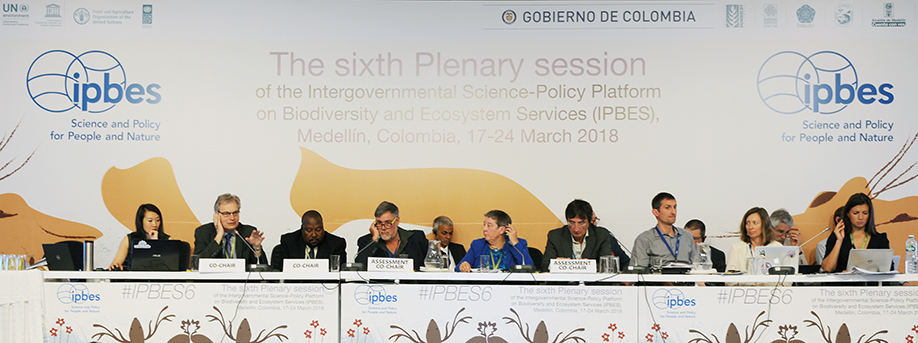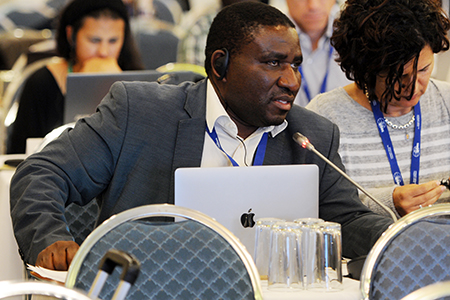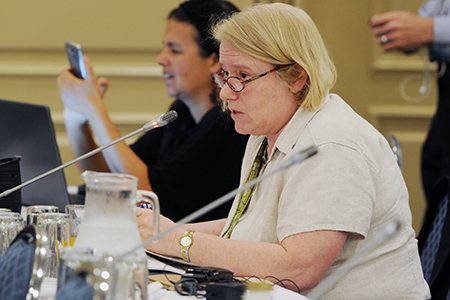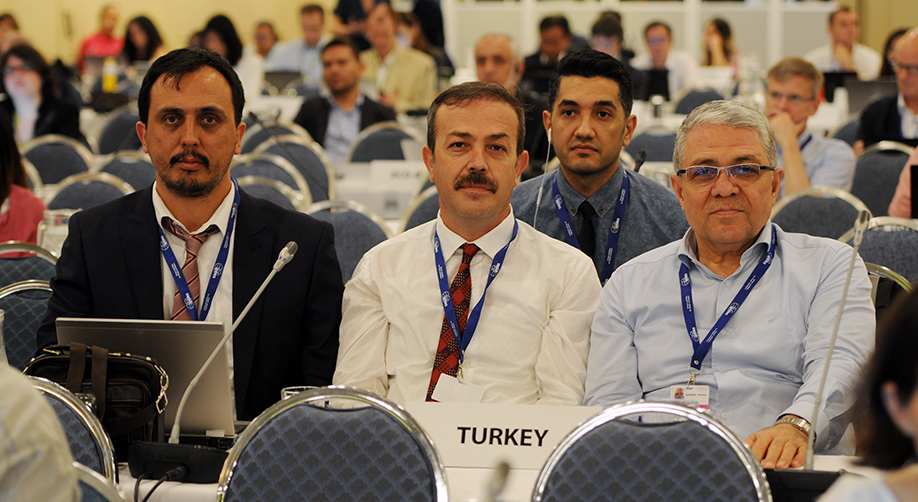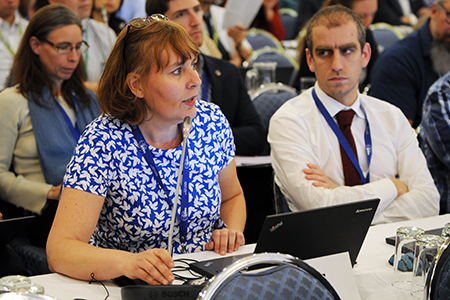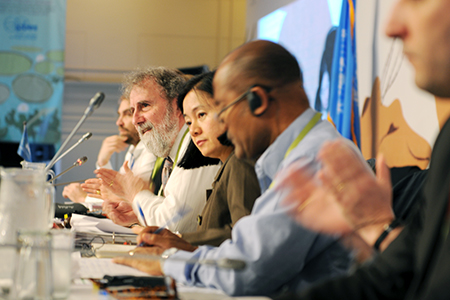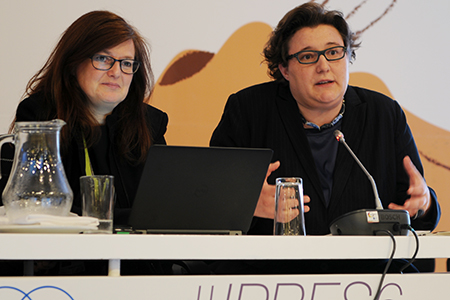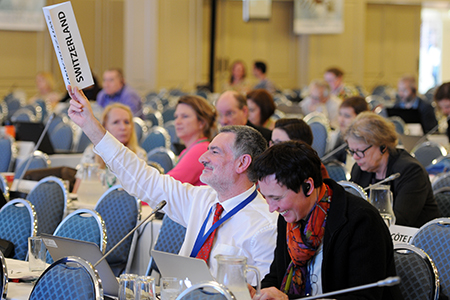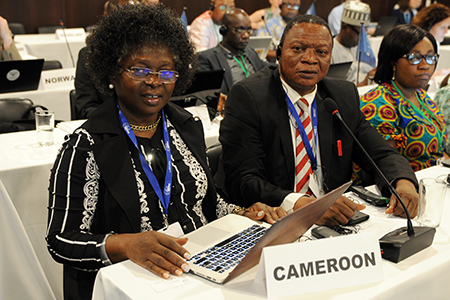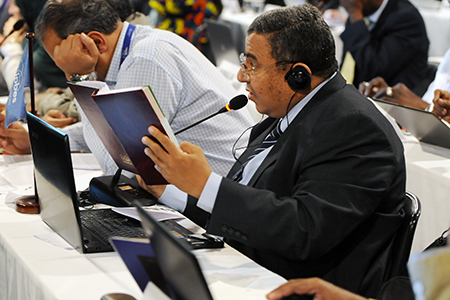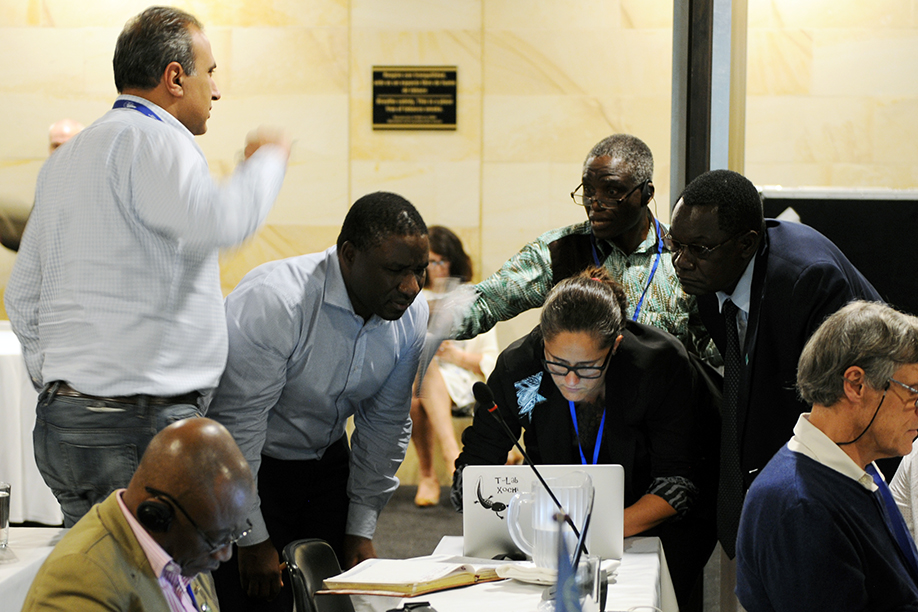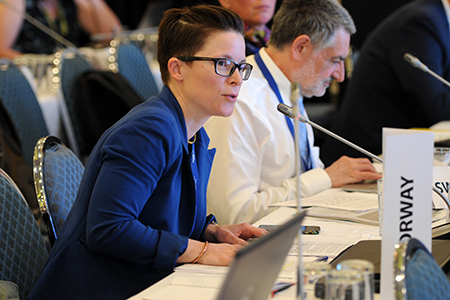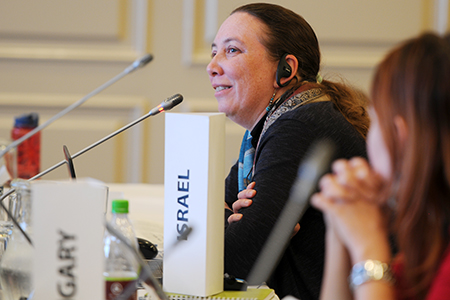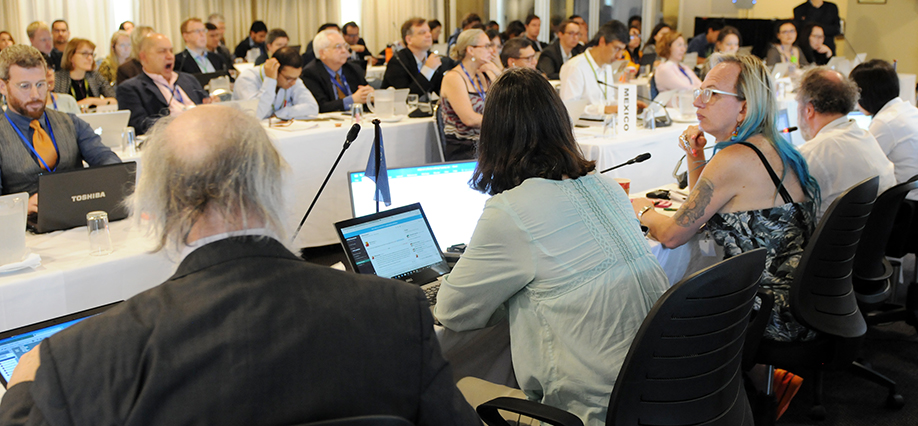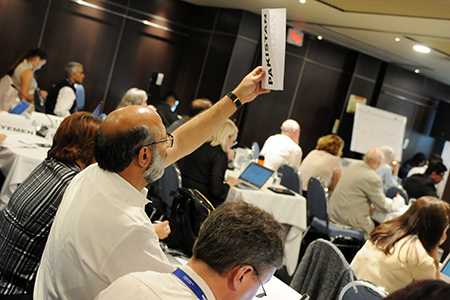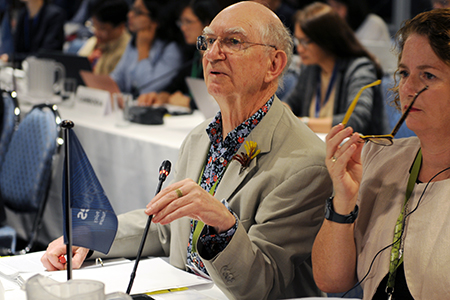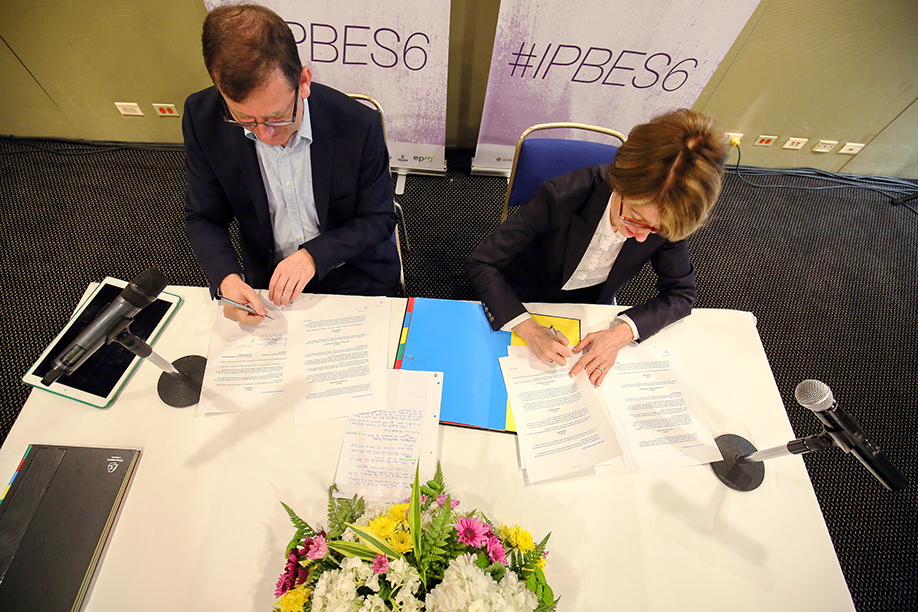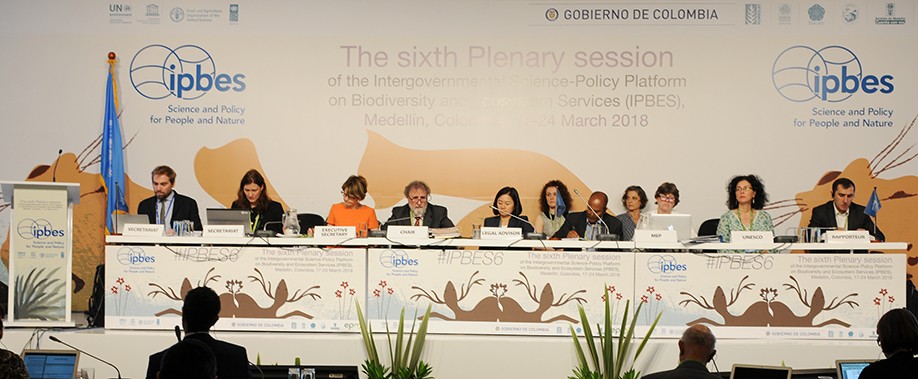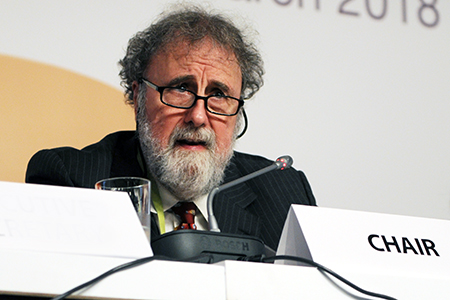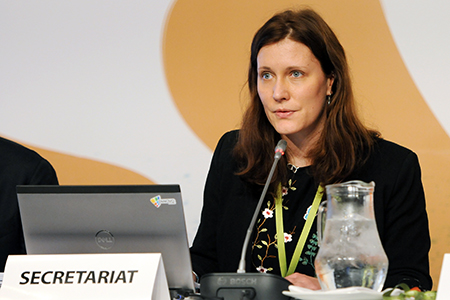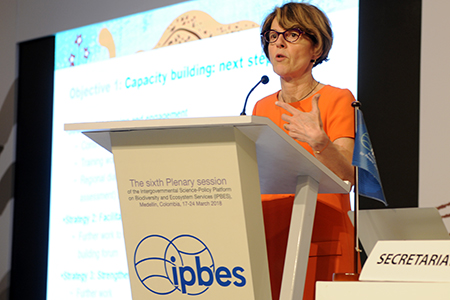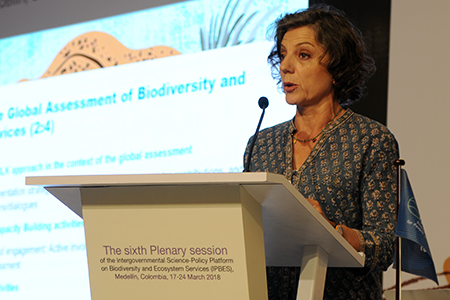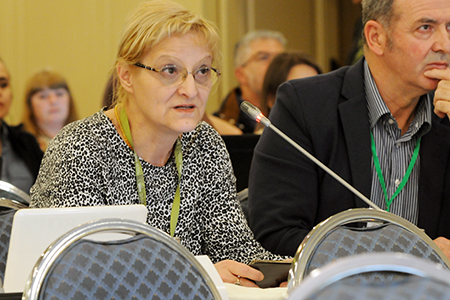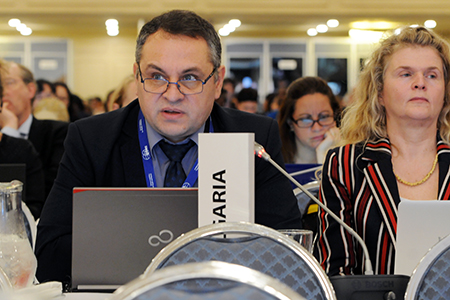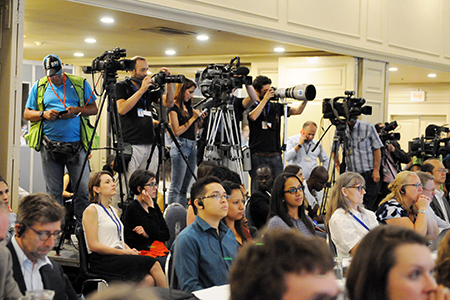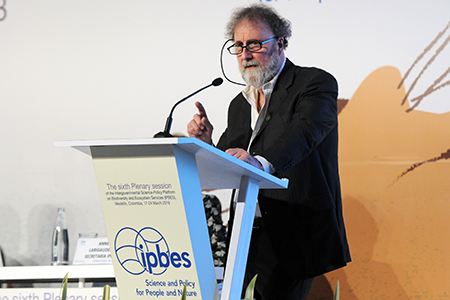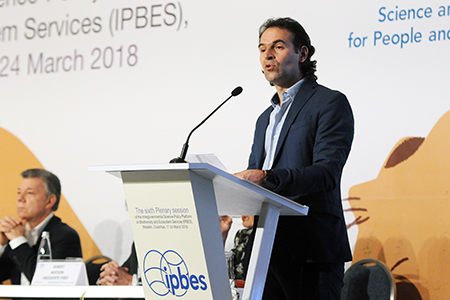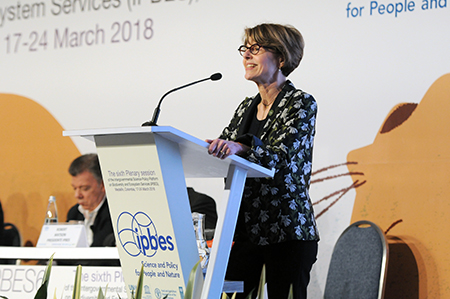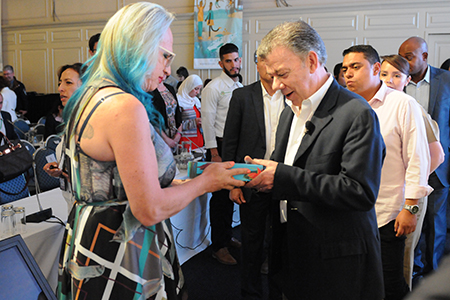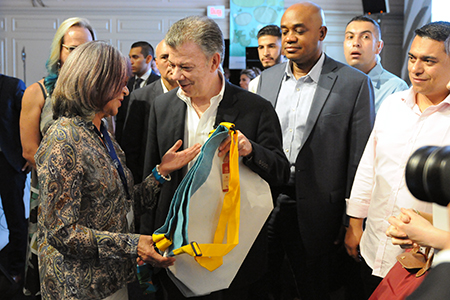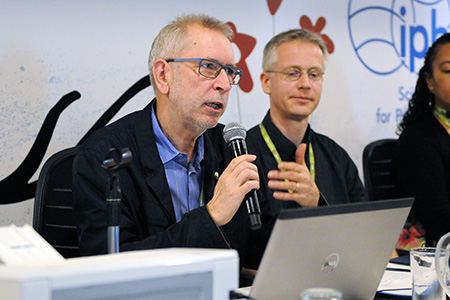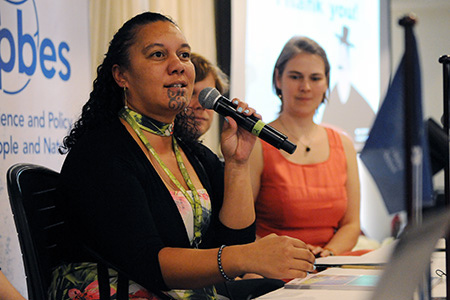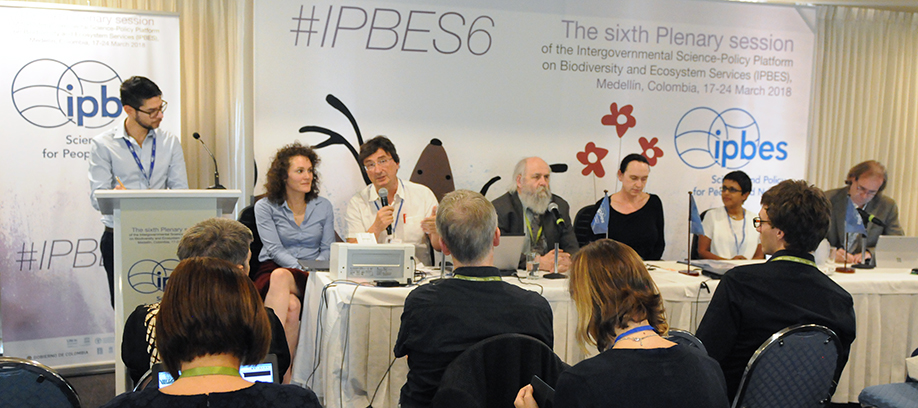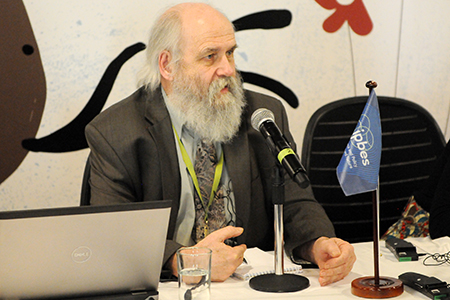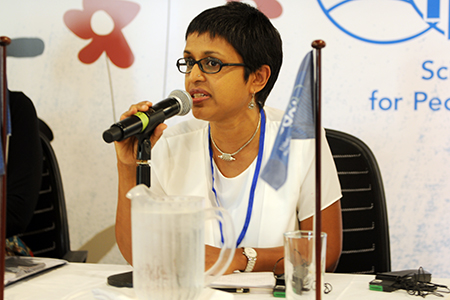Stakeholder Day and 6th Session of the Plenary of the
Intergovernmental Platform on Biodiversity and Ecosystem Services (IPBES-6)
17 and 18-24 March 2018 | Medellín, Colombia
Summary Highlights for the Meeting
Download ENB Meeting Reports |
||||||||||||||||||||
|
||||||||||||||||||||


| Follow @iisdrs | ||

IPBES Chair Robert Watson, UK, gaveled the meeting to a close at 3:00 pm |
||
Highlights for Saturday, 24 March 2018
Plenary convened in the morning and early afternoon to complete several outstanding organizational matters, elect new members to the Bureau and the Multidisciplinary Expert Panel (MEP), approve the remaining summary for policy makers (SPM), and adopt the session’s decisions and the meeting’s report. Highlights of the closing plenary included the following:
In their closing statements, regional representatives lauded the success of IPBES-6 having adopted five assessments and underlined their importance for policy making at the global, regional, and subregional level. Members of the MEP and several assessment Co-Chairs recognized the outstanding contributions by volunteer experts to the development of the assessments. Stakeholder groups stressed the need to recognize the contributions of all stakeholders. IPBES Executive Secretary Anne Larigauderie urged outgoing members of the MEP to form an alumni organization to continue supporting the Platform and reported on successful media outreach and uptake of the regional assessments. IPBES Chair Watson said the adoption of seven assessments in five years has brought IPBES’ performance up to par with the 30-year-old IPCC, noting that the next step should be for both platforms to work collaboratively. He gaveled the meeting to a close at 3:00pm. ENB SUMMARY AND ANALYSIS: The Earth Negotiations Bulletin summary and analysis of IPBES-6 is available here. |
||
IISD Reporting Services, through its Earth Negotiations Bulletin (ENB) Meeting Coverage, provided daily digital coverage and daily reports from IPBES-6. In addition, IISD Reporting Services has produced a summary and analysis report of IPBES-6, which is now available in HTML and PDF. Photos by IISD/ENB | Natalia Mroz and Diego Noguera + Visit the web coverage for Saturday, 24 March 2018 |
||
|
|
|
|
|
Highlights for Friday, 23 May 2018
On Friday, IPBES-6 delegates finalized their discussions on pending assessments, implementation of IPBES’ first work programme and development of the next work programme. The contact group on land degradation and restoration continued to negotiate the summary for policy makers (SPM) of the assessment throughout the day and into the night. Highlights of the day included the following:
|
||
+ Visit the web coverage for Friday, 23 March 2018 | ||
|
|
|
|
Highlights for Thursday, 22 March 2018
On Thursday, IPBES-6 delegates continued their discussion of the key findings of the assessment on land degradation and restoration and discussed how to proceed with three pending assessments of the first work programme. Delegates also started working on the development of the next work programme for IPBES. In the evening, plenary convened to finalize the regional assessments. Highlights of the day included the following:
|
||
+ Visit the web coverage for Thursday, 22 March 2018 |
||
|
|
|
|
|
|
Highlights for Wednesday, 21 March 2018
On Wednesday, IPBES-6 delegates started to consider the summary for policy makers for the thematic assessment on land degradation and restoration and discussed the review of the Platform. The contact group on the regional assessment of biodiversity and ecosystem services in the Americas reconvened to resolve outstanding issues. The budget group continued its deliberations. Throughout the day, delegates discussed how to craft short, clear, and understandable messages for policy makers. When discussing the lessons learned from the Platform’s internal review, several suggested that summaries for policy makers should be much shorter and simpler to ensure uptake by decision makers. Highlights of the day included the following:
|
||
+ Visit the web coverage for Wednesday, 21 March 2018 |
||
|
|
|
|
|
|
Highlights for Tuesday, 20 March 2018
IPBES-6 delegates met briefly in plenary in the morning to take stock of progress and finalize several operational decisions. The Co-Chairs of the contact groups on the regional assessments provided updates and outlined next steps towards finalizing the negotiations in the contact groups. Budget contact group Co-Chair Spencer Thomas reported that the Secretariat had provided clarity on the three budget scenarios to the group. Delegates then resumed negotiating the summaries for policy makers (SPMs) of the regional assessments in four contact groups. The day’s highlights included the following:
|
||
+ Visit the web coverage for Tuesday, 20 March 2018 |
||
|
|
|
|
|
|
|
Highlights for Monday, 19 March 2018
On Monday, IPBES-6 delegates continued discussing the key findings of the four regional assessments of biodiversity and ecosystem services in contact groups throughout the day and in the evening. While each group focused on the specific messages of its respective assessment, several cross-cutting concerns emerged during the day; most prominently the use of the concept of ‘nature’s contributions to people.’ Introduced by the scientists of the IPBES’ Multilateral Expert Panel and adopted at IPBES-5, the approach aims to better reflect the complex relationship between humans and nature, and the diversity of perspectives on those relationships. Other cross-cutting issues included the relevance of biodiversity for different economic sectors and the need to ensure that the messages in the summaries for policy makers (SPMs) are backed by strong evidence. Highlights of the day included the following:
|
||
+ Visit the web coverage for Monday, 19 March 2018 |
||
|
|
|
|
|
|
Highlights for Sunday, 18 March 2018
The sixth session of the Plenary of the Intergovernmental Platform on Biodiversity and Ecosystem Services (IPBES-6) opened on Sunday with opening statements and reports on progress. Members then initiated discussions on the summaries for policy makers (SPMs) of four regional assessments of biodiversity and ecosystem services and the assessment on land degradation and restoration. Plenary also opened all other items on the agenda and referred substantive items to contact groups that will meet during the week. Highlights of the day included:
In the evening, four contact groups began discussing the SPMs of the four regional assessments. |
||
+ Visit the web coverage for Sunday, 18 March 2018 |
||
|
|
|
|
|
|
Highlights of the Opening Ceremony
Carlos Tapia, Humboldt Institute, facilitated the opening ceremony of the sixth Plenary Session of the Intergovernmental Platform on Biodiversity and Ecosystem Services (IPBES-6). Federico Gutiérrez Zuluaga, Mayor of Medellín, Colombia, highlighted the city’s commitment to a green development pathway including through payment for ecosystem services involving the municipal government and communities living around watersheds. IPBES Executive Secretary Anne Larigauderie underlined the ambitious nature of IPBES-6 with the expected approval of five assessments. She drew attention to the vital contributions of these assessments to key policy mechanisms, including the fifth edition of the Global Biodiversity Outlook and the 2030 Agenda and the Sustainable Development Goals (SDGs). Via video message UNEP Executive Director Erik Solheim, stressed the need for political will to address biodiversity loss, called for private sector engagement to ensure restoration of degraded lands and sustainable livelihoods, and emphasized the importance of communicating science in an exciting and innovative way. He underlined that “we cannot bore people into action.” IPBES Chair Robert Watson (UK) emphasized that historical degradation and destruction of the environment have undermined the well-being of current and future generations. He noted the importance of IPBES-6 in ensuring public recognition of the dangers of biodiversity loss, adding that failure to address this loss will compromise the ability to meet many SDGs. In a keynote address, President Juan Manuel Santos, Colombia, highlighted several ongoing efforts to restore and preserve biodiversity throughout Colombia, a mega-biodiverse nation, including inter alia: increasing the number of terrestrial protected areas (PAs) by 14% and marine PAs (MPAs) by 13%; and regional efforts to protect marine corridors of the Andes, the Amazon and the Atlantic. |
||
|
|
|
|
|
|
|
President Santos receives gifts from delegates at the end of the ceremony |
||
Highlights of the Stakeholder Day
The Stakeholder Day preceding the sixth session of the Plenary of the Intergovernmental Platform on Biodiversity and Ecosystem Services (IPBES-6) was held on Saturday, 17 March 2018 in Medellín, Colombia, followed by the IPBES-6 Opening Ceremony. Stakeholder Day provided an opportunity for organizations interested in the IPBES process to discuss their engagement in the Plenary session. IPBES-6 is expected to finalize and launch five science-policy assessment reports and summaries for policymakers (SPMs): a thematic assessment on land degradation and restoration; and regional assessments on biodiversity and ecosystem services in the Americas, Asia and the Pacific, Africa, and Europe and Central Asia. Stakeholder Day discussions focused on:
|
||
|
|
|
|
|
|
|
IISD Reporting Services is grateful to the many donors of the Earth Negotiations Bulletin (ENB) and recognizes the following as core contributors to the ENB: the European Union and the Kingdom of Saudi Arabia. General Support for the Bulletin during 2018 is provided by the German Federal Ministry for the Environment, Nature Conservation, Building and Nuclear Safety (BMUB), Italian Ministry for the Environment, Land and Sea, Japanese Ministry of Environment (through the Institute for Global Environmental Strategies - IGES), New Zealand Ministry of Foreign Affairs and Trade, Swedish Ministry of Foreign Affairs, Government of Switzerland (Swiss Federal Office for the Environment (FOEN)), and SWAN International. Funding for translation of the Bulletin into French has been provided by the Government of France, Québec, and the Institute of La Francophonie for Sustainable Development (IFDD), a subsidiary body of the International Organization of La Francophonie (OIF). |
||
